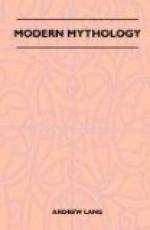Yet Mr. Max Muller offers the suggestion that the obscurity of many of these names of mythical gods and heroes ’may be due . . . to the riddles to which they had given rise, and which would have ceased to be riddles if the names had been clear and intelligible, like those of Helios and Selene’ (i. 92). People, he thinks, in making riddles ’would avoid the ordinary appellatives, and the use of little-known names in most mythologies would thus find an intelligible explanation.’ Again, ’we can see how essential it was that in such mythological riddles the principal agents should not be called by their regular names.’ This last remark, indeed, is obvious. To return to the Norse riddle of the Dark One that swallows wood and water. It would never do in a riddle to call the Dark One by his ordinary name, ‘Mist.’ You would not amuse a rural audience by asking ‘What is the mist that swallows wood and water?’ That would be even easier than Mr. Burnand’s riddle for very hot weather:—
My first is a boot, my second is a jack.
Conceivably Mr. Max Muller may mean that in riddles an almost obsolete word was used to designate the object. Perhaps, instead of ’the Dark One,’ a peasant would say, ‘What is the Rooky One?’ But as soon as nobody knew what ‘the Rooky One’ meant, the riddle would cease to exist—Rooky One and all. You cannot imagine several generations asking each other—
What is the Rooky One that swallows?
if nobody knew the answer. A man who kept boring people with a mere ‘sell’ would be scouted; and with the death of the answerless riddle the difficult word ‘Rooky’ would die. But Mr. Max Muller says, ’Riddles would cease to be riddles if the names had been clear and intelligible.’ The reverse is the fact. In the riddles he gives there are seldom any ‘names;’ but the epithets and descriptions are as clear as words can be:—
Who are the mother and children
in a house, all having bald heads?—The
moon and stars.
Language cannot be clearer. Yet the riddle has not ’ceased to be a riddle,’ as Mr. Max Muller thinks it must do, though the words are ’clear and intelligible.’ On the other hand, if the language is not clear and intelligible, the riddle would cease to exist. It would not amuse if nobody understood it. You might as well try to make yourself socially acceptable by putting conundrums in Etruscan as by asking riddles in words not clear and intelligible in themselves, though obscure in their reference. The difficulty of a riddle consists, not in the obscurity of words or names, but in the description of familiar things by terms, clear as terms, denoting their appearance and action. The mist is described as ‘dark,’ ‘swallowing,’ ‘one that fears the wind,’ and so forth. The words are pellucid.
Thus ‘ordinary appellatives’ (i. 99) are not ‘avoided’ in riddles, though names (sun, mist) cannot be used in the question because they give the answer to the riddle.




